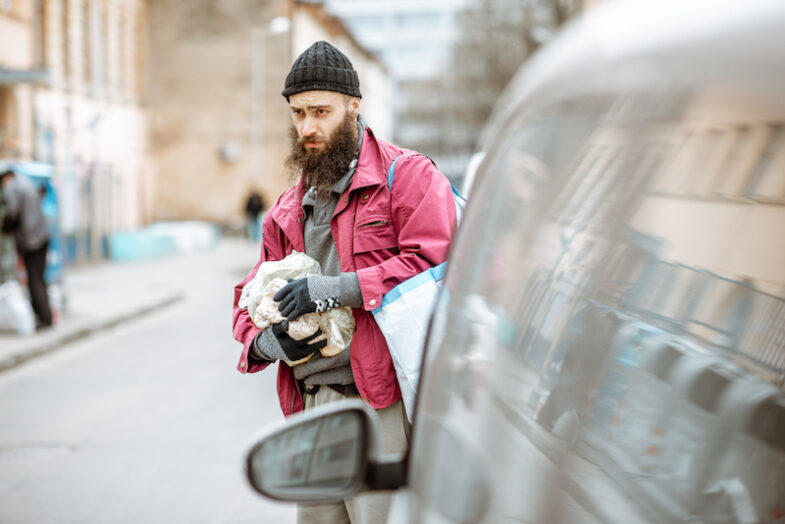Homelessness is a major problem nationwide. According to the National Alliance to End Homelessness’s State of Homelessness: 2021 Edition, 580,466 people were experiencing homelessness in America in January 2020. 19% of individuals experiencing homelessness are classified as being chronically homeless.
“Chronically homeless” individuals have been continuously homeless for at least a year or have experienced homelessness at least four times in the last three years for a combined length of time of at least a year. Chronically homeless individuals may also have disabilities that make it difficult to maintain independent housing. As a result, 66% of people who are chronically homeless do not have any shelter at all!
Despite these shocking statistics, there is a certain “invisibility” towards people who are experiencing homelessness. It’s almost as though if others “turn a blind eye” to homelessness, it doesn’t exist. What’s even worse than ignoring this vulnerable population is the fact that their very existence and ability to survive are often criminalized. Therefore, not only does our society tend to ignore people who are experiencing homelessness and pretend they’re invisible, but we penalize them and criminalize them if they cross our paths. We must work to end these atrocities. We must share the truth about what experiencing homelessness is like and erase the stigmas surrounding homelessness.
At Unity Parenting and Counseling, we want to shine a new light on this vulnerable population. To truly help adults and youth who are experiencing homelessness, we must understand the stigmas they face on a daily basis and how those stigmas affect them. Only then can we make real change. If we want to change our approach to homelessness, our attitudes about homelessness must also change.
Stigmas Surrounding Homelessness

Stigmas often arise from a lack of understanding or fear, both of which can be exacerbated by inaccurate or misleading representations in the media. Stigmas can lead to stereotypes, prejudices, and discrimination. People who are experiencing homelessness are marginalized and discriminated against in various ways. The first step to eradicating homelessness is knowing what stigmas surrounding homelessness exist and their impact on people who experience homelessness.
Here are a few phrases that perpetuate the negativity surrounding people experiencing homelessness and the truths behind them.
“Homeless people are dirty.”
Without regular access to bathing facilities, cleanliness proves to be a challenge. Beyond visible dirt and grime, however, people who are experiencing homelessness struggle with health concerns related to hygiene. By providing access to clean water and personal hygiene products, we can positively impact their mental and physical health.
“Homeless people are scam artists.”
People who are experiencing homelessness must do what they can to survive. The majority of those who ask for money are not trying to scam anyone. Rather, they are simply trying to put food in their bellies.
“Homeless people are violent criminals.”
The reality is that most people who are experiencing homelessness are more likely to be the victims of violence rather than the perpetrators.
“Homeless people deserve to be homeless.”
No human being ever deserves to be homeless. Shelter is a basic human need! Other biological requirements for human survival include air, food, water, clothing, warmth, and sleep. If these needs are not satisfied, the human body cannot function optimally. According to Maslow’s hierarchy of needs, physiological needs are the most important as all the other needs become secondary until these needs are met.
“Homeless people are lazy.”
Many people who are experiencing homelessness are in the situation as a result of experiences outside of their control. Mental health concerns can contribute to the inability to live independently or hold down a job. Those who are experiencing homelessness aren’t lazy or “just don’t want to work.” Rather, they need to get help and services and have their basic needs met.
The harsh language that people use to describe people who are experiencing homelessness negatively impacts the already marginalized group, which makes their lives even more difficult.
How Stigmas Affect People Experiencing Homelessness

People who experience homelessness endure personal and economic hardship as well as discrimination and exclusion. The stigmas surrounding homelessness are reflected in the way society, lawmakers, police, and the health care system interact with people experiencing homelessness. People experiencing homelessness are ignored, isolated, exploited, or even become victims of violence. These issues create even more barriers to stable housing and employment and worsen mental health issues.
To avoid being stigmatized, some individuals who are experiencing homelessness keep their housing status secret. This approach is common with youth who are experiencing homelessness. As a result, they are unable to enroll in services or find housing within their social network. They may also avoid entering public spaces for fear of being ridiculed or harassed. As such, they become further marginalized, and their struggle with meeting the basic human needs of food, clothing, and shelter becomes nearly impossible.
Destigmatizing Homelessness

There’s a better way to approach the issue of homelessness. Instead of ignoring, or worse, perpetuating, the issue, we need to actively destigmatize homelessness. To do this, we must advocate for those who are experiencing homelessness, encourage public education campaigns to defuse negative attitudes about the homeless, and provide better housing strategies to get more homeless people off the streets.
A solid three-step process for eliminating stigma and thus eliminating homelessness involves rejecting stigma around homelessness, changing our language surrounding homelessness, and approaching housing differently.
Reject stigmas associated with homelessness.
There is a belief that people experiencing homelessness had a choice in the matter, and they chose homelessness. Because of this false premise, some areas have passed “anti-homeless” laws that criminalize people sitting or loitering in public spaces. These laws keep homeless people out of sight and deprive them of access to basic medical and social services that could improve their lives.
To reject this stigma, we must recognize that people experiencing homelessness, particularly those living on the streets in chronic homelessness, do not choose to do so. Rejecting stigmas is a crucial first step in addressing the issue of homelessness. To do this, we must engage with people who are experiencing homelessness to further understand the context surrounding their situation. Understanding their context will allow us to approach the problem realistically rather than relying on stigma-based assumptions.
Change how we refer to people experiencing homelessness.
Another way to destigmatize homelessness is to change the language surrounding the issue. Constantly using the term “homeless people” can keep the public from reshaping their thoughts about homelessness. Referring to people experiencing homelessness as “the homeless” is inaccurate. Homelessness does not define a person. Rather, it is something that someone experiences for a fixed period of time. Using the phrase “people experiencing homelessness” instead of “the homeless” can help us reshape the way we view the issue. It also helps to emphasize that we need to find ways to solve this temporary problem in someone’s life rather than focus on a way to deal with a permanent one.
Take a different approach than the one typically used by shelters.
Many shelters implement a process that they believe will alleviate issues to homelessness. Their policies permit people experiencing homelessness to stay in the shelter for a certain amount of time before they must leave. Then a certain amount of time must pass before they can return to the shelter. This approach is ineffective and does not take into account each individual’s circumstances.
Another flawed approach to solving homelessness is the “housing ready” approach. In this approach, people who are experiencing homelessness cannot receive permanent housing unless they achieve prerequisite goals that have been arbitrarily put in place to determine if someone is “housing ready.”
A much more effective way to solve homelessness is through the Housing First method. Through Housing First, everyone is inherently “housing ready.” According to the National Alliance to End Homelessness, “This approach is guided by the belief that people need basic necessities like food and a place to live before attending to anything less critical, such as getting a job, budgeting properly, or attending to substance use issues.” Through this approach, people experiencing homelessness can access housing and supportive services prior to addressing other issues like behavioral health concerns or substance abuse. The Housing First approach views housing as the foundation for life improvement and enables access to permanent housing without prerequisites or conditions beyond those of a typical renter. Other approaches do make such requirements in order for a person to obtain and retain housing.
Unity Parenting and Counseling supports the Housing First model, and we strive to make housing accessible to those in need, including marginalized populations.
- In the Flexible Housing Project, our case managers work with the assigned homeless youth to increase their housing and overall stability while decreasing their need to utilize crisis systems.
- The Focus Hope programs provide homeless individuals and families with safe and secure housing on Chicago’s South Side. Various rental options that honor the diversity of the populations served are pivotal to the success of the program and its participants. Support services are provided by the program or through community linkages.
- Project Ignite is a unique resource that provides stable housing for homeless youth aged 18-24 living with HIV/AIDS. It is the only program of its kind in Chicago.
Through these and other innovative programs, Unity Parenting and Counseling works to destigmatize homelessness and positively impact the lives of those experiencing homelessness. To learn more, join our mailing list today.